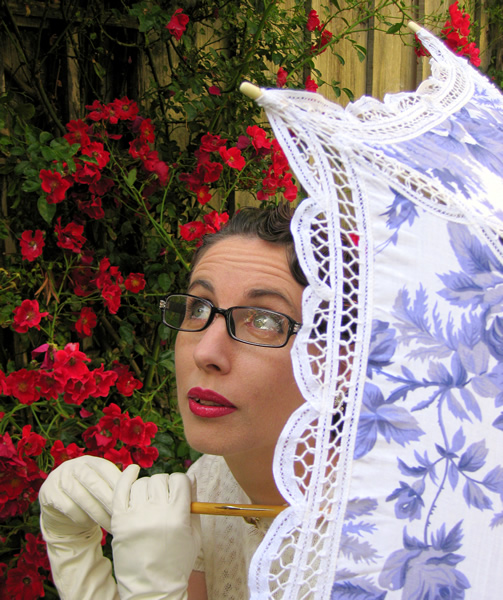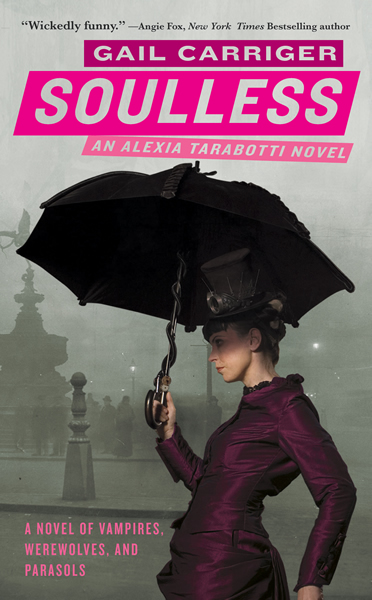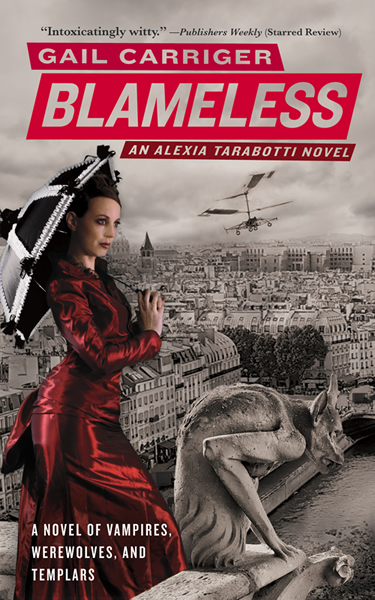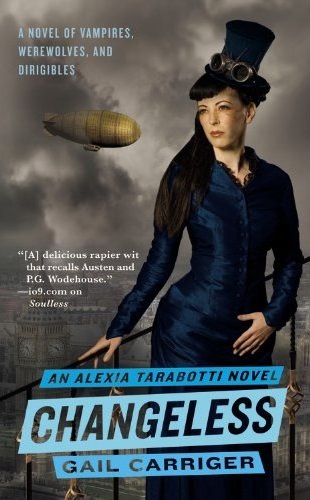An interview with Gail Carriger, author of The Parasol Protectorate series.
Rebekah Send a noteboard - 29/10/2010 10:55:57 AM
 New York Times Bestselling author Gail Carriger began writing in order to cope with being raised in obscurity by an expatriate Brit and an incurable curmudgeon. She escaped small town life and inadvertently acquired several degrees in Higher Learning. Ms. Carriger then traveled the historic cities of Europe, subsisting entirely on biscuits secreted in her handbag. She now resides in the Colonies, surrounded by fantastic shoes, where she insists on tea imported directly from London. She is fond of teeny tiny hats and tropical fruit. The Parasol Protectorate books are: Soulless (Oct. 2009), Changeless (March 2010), Blameless (Sept. 2010), Heartless (July 2011), and Timeless (2012). Soulless won the ALA's Alex Award.
New York Times Bestselling author Gail Carriger began writing in order to cope with being raised in obscurity by an expatriate Brit and an incurable curmudgeon. She escaped small town life and inadvertently acquired several degrees in Higher Learning. Ms. Carriger then traveled the historic cities of Europe, subsisting entirely on biscuits secreted in her handbag. She now resides in the Colonies, surrounded by fantastic shoes, where she insists on tea imported directly from London. She is fond of teeny tiny hats and tropical fruit. The Parasol Protectorate books are: Soulless (Oct. 2009), Changeless (March 2010), Blameless (Sept. 2010), Heartless (July 2011), and Timeless (2012). Soulless won the ALA's Alex Award. The RAFO Books Messageboard pulled together an interview recently and here are her replies. (You can also read our review of the first three books in the series via the link at the bottom of the interview.)
What inspired you to write – at all, and specifically about vampires and werewolves in Victorian London?
I've long been troubled by certain quirks of history that seem never adequately explained. The most confusing of these is how one tiny island with abysmal taste in food, excellent taste in beverages, and a penchant for poofy dresses suddenly managed to take over most of the known world. How did one tiny island manage to conquer an empire upon which the sun never set? I decided that the only possible answer was that England openly accepted supernatural creatures, and put them to good use, while other countries continued persecution. This led me to postulate that King Henry's breach with the Church was over open acceptance of vampires and werewolves into society (the divorce thing was just a front). This gave Great Britain a leg up dealing with messy little situations like winning major foreign battles or establishing an efficient bureaucracy or convincing the world cricket is a good idea. Suddenly, everything made sense: cravats cover bite marks, the British regimental system is clearly based on werewolf pack dynamics, and pale complexions are in vogue because everyone wants to look like the trend-setting vampires.
Considering the popularity of supernaturals in modern writing, how difficult was it to write them from a different angle?
I suspect I just think about them differently. I'm very irreverent in my approach and I use a lot of frivolousness and parody. I find many aspects of the concept of vampires and werewolves and ghosts ridiculous, and even more so if you place them in Victorian society. "Ah yes, vampires, jolly good chaps, excellent fashion sense, always polite, terribly charming at cards, we just won't mention that little neck biting habit."
How has your training as as archaeologist influenced your approach toward describing a 19th century British Empire with werewolves, vampires, and other supernatural creatures?
Archaeology has its provenance in the Victorian era, so I've studied the time period in an effort to understand my own discipline. This has helped me grasp the mindset of the scientists of the day. Archeology has also led me to approach the entire aspect of alt-history differently. We archaeologists work by interpreting existing facts. Instead of picking a jumping off piton and having a battle go differently and the world change as a result, I went with the premise that all the strange and absurd facts of real history could be explained away as the meddling of vampires and werewolves. This included the weirdest historical event of all: the expansion of the British Empire.
Which figures from history can you imagine as supernaturals?
I can't answer that specifically, because there would be spoilers. I can say that I have divided history into dominance of one species over the others. Ancient Rome belongs to the vampires, Ancient Greece to the humans, and Ancient Egypt to the werewolves for example. Obviously key players in (and therefore enemies of) these empires are going to have significant supernatural agendas. The actual historical figures I mention in my series do tend to be less well known, or only known in their country of origin. This ties back to my archaeology background; I choose historical characters that I love and were powerful in their day but have lost ground in our current educational teachings. I also use historical figures whose deaths are shrouded in mystery, unknown, or debated by historians. Of course, there are many I can imagine as supernatural, but who never come up in the books. Someday I may compile a list.
 As a relatively new published author, what traits about yourself and your writing (strengths and weaknesses alike) have you begun to notice ever since Soulless was published last year?
As a relatively new published author, what traits about yourself and your writing (strengths and weaknesses alike) have you begun to notice ever since Soulless was published last year?I'm good with comedy, struggle with sentimentality, and hate writing nookie. Because I was a professor, I'm also one of those few authors who can handle public speaking without flinching. I had no idea how useful that would be. Time management is the single hardest skill to learn as a full time writer. I get sick more often, possibly because I'm not out fraternizing as frequently so when I do go out, I get ill almost instantly. Also, as a dancer I find it physically difficult to stay still for the amount of time needed to write. I was not prepared for contact with fans and their expectations of me, I thought it would take much longer to build up a base. Learning to say no and put people off when I have a deadline has also been a challenge. Not just fans but inquires for short story anthologies, interviews, even book proposals. Chances I would have jumped at only a year or so ago now have to get filed away under the "wait until the next novel is finished" heading. But there always seems to be a next novel.
As an author who's had three serial novels published in the past thirteen months, is there ever a worry that there might be a sort of "fatigue" developing with the setting, the characters, and their situations?
For me or my readers? For my readers, so far, no. In fact, they complain that there isn't more. For me, yes. I still love the world, but I am ready to move on to new characters. It was me (not my house, agent, or editor) who wanted to stop at 5 books. I refuse to be one of those authors who beats the dead horse simply because it generates income. I have other characters who want to have their moment to shine. That said, this is my job, and in the end I will give people what they want to buy (I don't approve of the "author as creative arteest" folderol), so anything is possible. I reserve the right to have characters from one series appear in another. That's the beauty of writing immortals.
Mad scientists are the villains in the first book, and invoke Dürrenmatt's play "The Physicists", which questions ethics in science. What are your views on regulations on science and scientists? Do you see such dangers (both in the form of mad scientists and overly strict regulations) in today's science?
Mmm. In a way I was parodying Gothics like Dr. Jekyll and Mr. Hyde, which represented a switch from fear of religious monsters (for example, moral corruption like that in The Monk) to the demonization of science and the monsters it could produce. However, if you look at my next two books you'll realize that I myself am not entirely supportive of this demonization. My real fear, and the thing Alexia is always battling in society, is obsession. What's bad about the scientists in the first book is not their science, but their human failing in taking their obsession with that science too far. In the second book I vilify obsession with immortality. In the third, I tackle religious obsession.

Which invention from your books would you most like to have in real life?
Ooo, Alexia's parasol!
Several imagined cast lists have popped up for a film of the books. Who would you choose to play Miss Tarabotti, Lord Maccon, Professor Lyall, Lord Akeldama and Madame Lefoux, given an infinite budget?
In short, Alexia = Gina Bellman, Lord Maccon = Sean Bean, Professor Lyall = Kevin McKidd, Lord Akeldama = Paul Bettany, Madame Lefoux = Audrey Tautou. [You can see more cast list ideas in the Interesting Links section at the bottom of this interview. - Rebekah]
In your non-fiction piece for Steampunk II: Steampunk Reloaded (anthology edited by Ann and Jeff VanderMeer), "Which is Mightier, the Pen or the Parasol?", you touch briefly upon the various aspects of steampunk literature. For those yet unable to read this piece, which appears to be steampunk's more enduring legacy: its subversion of past political/social views or its commentary on today's modern society?
Oh, definitely its commentary on modern society. Whenever one gets an aesthetic + literary movement that also has so many other components, one feels compelled to ask why it is being born right now, and what it may tell us about ourselves, our desires, and our feelings about the greater society around us.
After Timeless, are there future plans for more novels in The Parasol Protectorate? And can you share any tidbits about other writing plans you might have?
I genuinely hope so, I have many past and future characters I'd love to explore as well as side characters who would like their own books.
Who are your author influences?
PG Wodehouse, Austen, Dickens, and Victorian travel journals.
What are the most and least exciting things about being a published author?
The worst aspects of writing professionally are the long interminable waits between submission and publication, and the fact that payment comes in lump sums in an utterly unreliable and unpredictable manner. Those are also the best aspects.
Like most book websites, RAFO has its share of aspiring authors. What advice would you give to those who want to write?
Honestly and rather crudely? 1. Sit your arse in that chair and write. 2. When you're done writing only then do you get to edit. 3. Give it to three highly critical people to attack with red pens. 4. Fix it and submit it. 5. Let it go, sit your arse back down and write something else as different from the first as possible. 6. Wash and repeat.
Please describe your perfect cup of tea.
Twinings English Breakfast Gold Label lose leaf in a warmed stoneware teapot. Boiled well water steeped 5 minutes under the cozy. Whole milk, preferably from England or New Zealand, in the bottom of a bone china cup add the tea.
Several of our members think that pesto and cheese toasted sandwiches are heaven in food form. What’s your favourite pesto-based recipe?
I'm a purist, I love it over homemade gnocchi. But when I was excavating in northern Italy our cook would make pesto lasagna. I actually begin to cry when I think about how good it was.
The RAFO Regular Five:
1. Which authors do you enjoy reading?
Off the top of my head: Tamora Pierce, Patricia Briggs, Mercedes Lackey, Tanya Huff, Robin McKinley, I could keep going ...
2. What do you consider the most undervalued book (of any kind)?
M.T. Anderson's "Feed".
3. What are your favourite films?
In no particular order: Dangerous Liaisons, Pride & Prejudice (Colin Firth), Tipping the Velvet, North & South, Gosford Park, A Room With A View, Maurice, Cold Comfort Farm, Shooting Fish, Grosse Point Blank, Boondock Saints, Latter Days, Ever After, Underworld.

4. If you could be any element on the periodic table, which would you be and why?
Helium. Because I'm a rare noble gas that makes people squeak on a regular basis.
5. What will you name the three monkey butlers we're sending you for Christmas this year?
Eeek, Oook, and Ni!. Because I am 1. afraid of monkeys, 2. enamored of Terry Pratchett's Librarian, and 3. a Monty Python fan.
Thank you very much for agreeing to be interviewed by RAFO. We wish you all the best, and look forward to reading your next books.
Some interesting links:
Gail's website: here
Some cast lists:
Casting the Movie
Alexia put to the vote here.
Alexia Character Study.
Character Study of Lord Maccon.
Facebook group discussion on the subject here.
Other casting on LitSnit.
*MySmiley*
Outside of a dog, a book is man's best friend. Inside of a dog it's too dark to read. - Groucho Marx
Outside of a dog, a book is man's best friend. Inside of a dog it's too dark to read. - Groucho Marx
This message last edited by Jacob on 05/11/2010 at 02:04:30 PM
An interview with Gail Carriger, author of The Parasol Protectorate series.
- 29/10/2010 10:55:57 AM
45509 Views
This interview has actually made me interested in reading her books.
- 29/10/2010 04:22:48 PM
2735 Views
Am confus. Where was she a professor? In the States, a PHD is generally required.
- 30/10/2010 08:08:30 AM
2758 Views
Gail Carriger is a pseudonym
- 30/10/2010 03:01:29 PM
5192 Views
Oh, something just occurred to me about this interview
- 30/10/2010 03:03:37 PM
2785 Views
This is a good idea!
- 30/10/2010 11:11:50 PM
2561 Views
It is a great idea. Thanks, Larry.
- 31/10/2010 02:39:17 PM
2693 Views
Done. Not much of an article to work with, but I added a bit and referenced this interview. *NM*
- 31/10/2010 09:46:35 PM
1466 Views
Not in archaeology, to my knowledge. But thank you for the actual name.
- 30/10/2010 11:09:26 PM
2863 Views








 *NM*
*NM*
